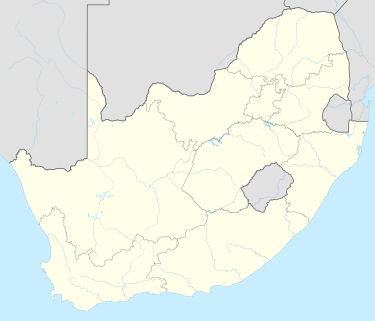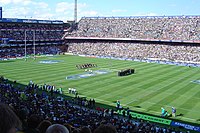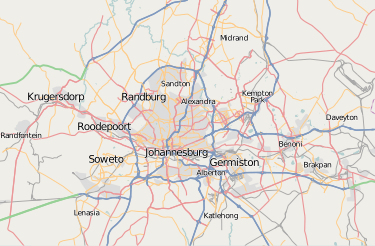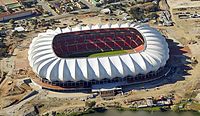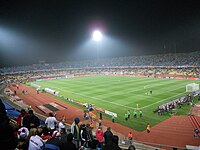User:PC120LAMEX/sandbox10
The 2010 FIFA World Cup, also branded as South Africa 2010, was the 19th FIFA World Cup, the world championship for men's national football teams. It took place in South Africa from 11 June to 11 July 2010. The bidding process for hosting the tournament finals was open only to African nations. In 2004, the international football federation, FIFA, selected South Africa over Egypt and Morocco to become the first African nation to host the finals.[1]
The matches were played in 10 stadiums in nine host cities around the country,[2] with the opening and final played at the Soccer City stadium in South Africa's largest city, Johannesburg.[3][4] Thirty-two teams were selected for participation[5] via a worldwide qualification tournament that began in August 2007. In the first round of the tournament finals, the teams competed in round-robin groups of four teams for points, with the top two teams in each group proceeding. These 16 teams advanced to the knockout stage, where three rounds of play decided which teams would participate in the final.
In the final, Spain, the European champions, defeated third-time losing finalists the Netherlands 1–0 after extra time to win their first world title. Spain became the eighth nation to win the tournament and the first European nation to win a World Cup hosted outside its home continent: all previous World Cups held outside Europe had been won by South American nations. They are also the first national team since 1978 to win a World Cup after losing a game in the group stage. As a result of their win, Spain represented the World in the 2013 FIFA Confederations Cup. Host nation South Africa were eliminated in the group stage along with both 2006 World Cup finalists Italy and France. It was the first time that the hosts had been eliminated in the first stage. New Zealand, with their three draws, were the only undefeated team in the tournament, but they were also eliminated in the group stage.
Host selection
[edit]Africa was chosen as the host for the 2010 World Cup as part of a short-lived rotation policy, abandoned in 2007,[6] to rotate the event among football confederations. Five African nations placed bids to host the 2010 World Cup: Egypt, Morocco, South Africa and a joint bid from Libya and Tunisia.
Following the decision of the FIFA Executive Committee not to allow co-hosted tournaments, Tunisia withdrew from the bidding process. The committee also decided not to consider Libya's solo bid as it no longer met all the stipulations laid down in the official List of Requirements.
The winning bid was announced by FIFA president Sepp Blatter at a media conference on 15 May 2004 in Zürich; in the first round of voting, South Africa received 14 votes, Morocco received 10 votes and Egypt no votes. South Africa, which had narrowly failed to win the right to host the 2006 event, was thus awarded the right to host the tournament.[7] Campaigning for South Africa to be granted host status, Nelson Mandela had previously spoken of the importance of football in his life, stating that while incarcerated in Robben Island prison playing football "made us feel alive and triumphant despite the situation we found ourselves in".[8] With South Africa winning their bid, an emotional Mandela raised the FIFA World Cup Trophy.[9]
During 2006 and 2007, rumours circulated in various news sources that the 2010 World Cup could be moved to another country.[10][11] Franz Beckenbauer, Horst R. Schmidt, and, reportedly, some FIFA executives expressed concern over the planning, organisation, and pace of South Africa's preparations.[10][12] FIFA officials repeatedly expressed their confidence in South Africa as host, stating that a contingency plan existed only to cover natural catastrophes, as had been in place at previous FIFA World Cups.[13]
Bribery and corruption
[edit]On 28 May 2015, media covering the 2015 FIFA corruption case reported that high-ranking officials from the South African bid committee had secured the right to host the World Cup by paying US$10 million in bribes to then-FIFA Vice President Jack Warner and to other FIFA Executive Committee members.[14]
On 4 June 2015, FIFA executive Chuck Blazer, having co-operated with the FBI and the Swiss authorities, confirmed that he and the other members of FIFA's executive committee were bribed in order to promote the South African 1998 and 2010 World Cup bids. Blazer stated, "I and others on the FIFA executive committee agreed to accept bribes in conjunction with the selection of South Africa as the host nation for the 2010 World Cup."[15][16]
On 6 June 2015, The Daily Telegraph reported that Morocco had actually won the vote, but South Africa was awarded the tournament instead.[17]
Qualification
[edit]The qualification draw for the 2010 World Cup was held in Durban on 25 November 2007. As the host nation, South Africa qualified automatically for the tournament. As happened in the previous tournament, the defending champions were not given an automatic berth, and Italy had to participate in qualification. With a pool of entrants comprising 204 of the 208 FIFA national teams at the time, the 2010 World Cup shares with the 2008 Summer Olympics the record for most competing nations in a sporting event.
Some controversies arose during the qualifications. In the second leg of the play-off between France and the Republic of Ireland, French captain Thierry Henry, unseen by the referee, handled the ball in the lead up to a late goal, which enabled France to qualify ahead of Ireland, sparking widespread comment and debate. FIFA rejected a request from the Football Association of Ireland to replay the match,[18] and Ireland later withdrew a request to be included as an unprecedented 33rd World Cup entrant.[19][20] As a result, FIFA announced a review into the use of technology or extra officials at the highest level, but decided against the widely expected fast-tracking of goal-line referee's assistants for the South African tournament.[21]
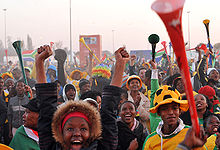
Costa Rica complained over Uruguay's winning goal in the CONMEBOL–CONCACAF playoff,[22] while Egypt and Algeria's November 2009 matches were surrounded by reports of crowd trouble. On the subject of fair play, FIFA President Sepp Blatter said:
I appeal to all the players and coaches to observe this fair play. In 2010 we want to prove that football is more than just kicking a ball but has social and cultural value ... So we ask the players 'please observe fair play' so they will be an example to the rest of the world.[23]
Slovakia was making its first appearance as an independent nation but had previously been represented as part of the Czechoslovakia team that had last played in the 1990 tournament; North Korea qualified for the first time since 1966; Honduras and New Zealand were both making their first appearances since 1982; Algeria were at the finals for the first time since the 1986 competition; and Greece qualified for the first time since 1994. Serbia also made its first appearance as an independent nation, having previously been present as Kingdom of Yugoslavia in 1930, as SFR Yugoslavia from 1950 to 1990, as FR Yugoslavia in 1998 and as Serbia and Montenegro in 2006.
Teams that failed to qualify for this tournament included Saudi Arabia, which had qualified for the previous four tournaments; Tunisia and Croatia, both of whom had qualified for the previous three finals; Costa Rica, Ecuador, Poland and Sweden, who had qualified for the previous two editions; 2006 quarter-finalists Ukraine and Euro 2008 semi-finalists Russia and Turkey. The highest ranked team not to qualify was Croatia (ranked 10th), while the lowest ranked team that did qualify was North Korea (ranked 105th).
As of 2022[update], this was the last time South Africa, New Zealand, North Korea, Paraguay, Slovakia and Slovenia qualified for a FIFA World Cup finals, and the last time Costa Rica, Iran, Belgium, and Croatia (only time) failed to qualify.
List of qualified teams
[edit]The following 32 teams, shown with final pre-tournament rankings,[24] qualified for the final tournament.
Preparations
[edit]Five new stadiums were built for the tournament, and five of the existing venues were upgraded. Construction costs were expected to be R8.4 billion (just over US$1 billion or €950 million).[25]
South Africa also improved its public transport infrastructure within the host cities, including Johannesburg's Gautrain and other metro systems, and major road networks were improved.[26] In March 2009, Danny Jordaan, the president of the 2010 World Cup organising committee, reported that all stadiums for the tournament were on schedule to be completed within six months.[27]
The country implemented special measures to ensure the safety and security of spectators in accordance with standard FIFA requirements,[28] including a temporary restriction of flight operation in the airspace surrounding the stadiums.[29]
At a ceremony to mark 100 days before the event, FIFA president Sepp Blatter praised the readiness of the country for the event.[30]
Construction strike
[edit]On 8 July 2009, 70,000 construction workers[31] who were working on the new stadiums walked off their jobs.[32] The majority of the workers receive R2500 per month (about £192, €224 or US$313), but the unions alleged that some workers were grossly underpaid. A spokesperson for the National Union of Mineworkers said to the SABC that the "no work no pay" strike would go on until FIFA assessed penalties on the organisers. Other unions threatened to strike into 2011.[33][34] The strike was swiftly resolved and workers were back at work within a week of it starting. There were no further strikes and all stadiums and construction projects were completed in time for the kick off.[35]
Prize money
[edit]The total prize money on offer for the tournament was confirmed by FIFA as US$420 million (including payments of US$40 million to domestic clubs), a 60 percent increase on the 2006 tournament.[36] Before the tournament, each of the 32 entrants received US$1 million for preparation costs. Once at the tournament, the prize money was distributed as follows:[36]
- US$8 million – To each team eliminated at the group stage (16 teams) ($11.18 million in 2025 US dollars[37])
- US$9 million – To each team eliminated in the round of 16 (8 teams) ($12.58 million in 2025 US dollars[37])
- US$14 million – To each team eliminated in the quarter-finals (4 teams) ($19.56 million in 2025 US dollars[37])
- US$18 million – Fourth placed team ($25.15 million in 2025 US dollars[37])
- US$20 million – Third placed team ($27.94 million in 2025 US dollars[37])
- US$24 million – Runner up ($33.53 million in 2025 US dollars[37])
- US$30 million – Winner ($41.92 million in 2025 US dollars[37])
In a first for the World Cup, FIFA made payments to the domestic clubs of the players representing their national teams at the tournament. This saw a total of US$40 million paid to domestic clubs. This was the result of an agreement reached in 2008 between FIFA and European clubs to disband the G-14 group and drop their claims for compensation dating back to 2005 over the financial cost of injuries sustained to their players while on international duty, such as that from Belgian club Charleroi S.C. for injury to Morocco's Abdelmajid Oulmers in a friendly game in 2004, and from English club Newcastle United for an injury to England's Michael Owen in the 2006 World Cup.[38][39][40]
Venues
[edit]In 2005, the organisers released a provisional list of 13 venues to be used for the World Cup: Bloemfontein, Cape Town, Durban, Johannesburg (two venues), Kimberley, Klerksdorp, Nelspruit, Orkney, Polokwane, Port Elizabeth, Pretoria, and Rustenburg. This was narrowed down to the ten venues[41] that were officially announced by FIFA on 17 March 2006.
The altitude of several venues affected the motion of the ball[42] and player performance,[43][44] although FIFA's medical chief downplayed this consideration.[45] Six of the ten venues were over 1,200 m (3,900 ft) above sea level, with the two Johannesburg venues—FNB Stadium (also known as Soccer City) and Ellis Park Stadium—the highest at approximately 1,750 m (5,740 ft).[46][47]
FNB Stadium, Cape Town Stadium, and Nelson Mandela Bay Stadium in Port Elizabeth were the most-used venues, each hosting eight matches. Ellis Park Stadium and Moses Mabhida Stadium in Durban hosted seven matches each, while Loftus Versfeld Stadium in Pretoria, Free State Stadium in Bloemfontein and Royal Bafokeng Stadium in Rustenburg hosted six matches each. Peter Mokaba Stadium in Polokwane and Mbombela Stadium in Nelspruit hosted four matches each, but did not host any knockout-stage matches.
The following stadiums were all upgraded to meet FIFA specifications:
|
Team base camps
[edit]The base camps were used by the 32 national squads to stay and train before and during the World Cup tournament. In February 2010, FIFA announced the base camps for each participating team.[53] Fifteen teams were in Gauteng Province, while six teams were based in KwaZulu-Natal, four in the Western Cape, three in North West Province, and one each in Mpumalanga, the Eastern Cape, and the Northern Cape.[54]
| Team base camps |
|---|
Final draw
[edit]Group stage
[edit]All times are South Africa Standard Time (UTC+2).
The tournament match schedule was announced in November 2007.[55][56] In the first round, or group stage, the 32 teams were divided into eight groups of four, with each team playing the other three teams in their group once. Teams were awarded three points for a win, one point for a draw and none for a defeat. The top two teams in each group advanced to the round of 16.
The South American teams performed strongly, with all five advancing to the round of 16 (four as group winners), and four further advancing to the quarter-finals. However, only Uruguay advanced to the semi-finals.
Of the six African teams, only Ghana advanced to the round of 16. South Africa became the first host nation in World Cup history to be eliminated in the first round, despite beating France and drawing with Mexico, while Ghana and Ivory Coast were the only other African teams to win a match. The overall performance of the African teams, in the first World Cup to be hosted on the continent, was judged as disappointing by observers such as Cameroon great Roger Milla.[57]
Only six out of the thirteen UEFA teams advanced to the round of 16, a record low since the introduction of this stage in 1986. Nonetheless, the final was contested by two European teams.[58] In another World Cup first, the two finalists from the preceding tournament, Italy and France, were eliminated at the group stage, with Italy becoming the third defending champions to be eliminated in the first round after Brazil in 1966 and France in 2002.[59] New Zealand, one of the lowest-ranked teams, surprised many by drawing all three of their group matches, ending the tournament as the only undefeated team.
| Tie-breaking criteria for group play |
|---|
Teams were ranked on the following criteria:[60]
|
Group A
[edit]
| Pos | Team | Pld | W | D | L | GF | GA | GD | Pts | Qualification |
|---|---|---|---|---|---|---|---|---|---|---|
| 1 | 3 | 2 | 1 | 0 | 4 | 1 | +3 | 7 | Advance to knockout stage | |
| 2 | 3 | 1 | 1 | 1 | 3 | 1 | +2 | 4 | ||
| 3 | 3 | 1 | 1 | 1 | 3 | 5 | −2 | 4 | ||
| 4 | 3 | 0 | 1 | 2 | 1 | 4 | −3 | 1 |
Group B
[edit]
| Pos | Team | Pld | W | D | L | GF | GA | GD | Pts | Qualification |
|---|---|---|---|---|---|---|---|---|---|---|
| 1 | 3 | 3 | 0 | 0 | 7 | 1 | +6 | 9 | Advance to knockout stage | |
| 2 | 3 | 1 | 1 | 1 | 5 | 6 | −1 | 4 | ||
| 3 | 3 | 1 | 0 | 2 | 2 | 5 | −3 | 3 | ||
| 4 | 3 | 0 | 1 | 2 | 3 | 5 | −2 | 1 |
| South Korea | 2–0 | |
|---|---|---|
|
Report |
| Argentina | 4–1 | |
|---|---|---|
|
Report |
|
| Nigeria | 2–2 | |
|---|---|---|
| Report |
|
| Greece | 0–2 | |
|---|---|---|
| Report |
|
Group C
[edit]
| Pos | Team | Pld | W | D | L | GF | GA | GD | Pts | Qualification |
|---|---|---|---|---|---|---|---|---|---|---|
| 1 | 3 | 1 | 2 | 0 | 4 | 3 | +1 | 5 | Advance to knockout stage | |
| 2 | 3 | 1 | 2 | 0 | 2 | 1 | +1 | 5 | ||
| 3 | 3 | 1 | 1 | 1 | 3 | 3 | 0 | 4 | ||
| 4 | 3 | 0 | 1 | 2 | 0 | 2 | −2 | 1 |
| England | 1–1 | |
|---|---|---|
|
Report |
|
| Slovenia | 2–2 | |
|---|---|---|
|
Report |
| United States | 1–0 | |
|---|---|---|
|
Report |
Group D
[edit]
| Pos | Team | Pld | W | D | L | GF | GA | GD | Pts | Qualification |
|---|---|---|---|---|---|---|---|---|---|---|
| 1 | 3 | 2 | 0 | 1 | 5 | 1 | +4 | 6 | Advance to knockout stage | |
| 2 | 3 | 1 | 1 | 1 | 2 | 2 | 0 | 4 | ||
| 3 | 3 | 1 | 1 | 1 | 3 | 6 | −3 | 4 | ||
| 4 | 3 | 1 | 0 | 2 | 2 | 3 | −1 | 3 |
Group E
[edit]
| Pos | Team | Pld | W | D | L | GF | GA | GD | Pts | Qualification |
|---|---|---|---|---|---|---|---|---|---|---|
| 1 | 3 | 3 | 0 | 0 | 5 | 1 | +4 | 9 | Advance to knockout stage | |
| 2 | 3 | 2 | 0 | 1 | 4 | 2 | +2 | 6 | ||
| 3 | 3 | 1 | 0 | 2 | 3 | 6 | −3 | 3 | ||
| 4 | 3 | 0 | 0 | 3 | 2 | 5 | −3 | 0 |
| Netherlands | 2–0 | |
|---|---|---|
| Report |
| Netherlands | 1–0 | |
|---|---|---|
|
Report |
| Cameroon | 1–2 | |
|---|---|---|
| Report |
|
Group F
[edit]
| Pos | Team | Pld | W | D | L | GF | GA | GD | Pts | Qualification |
|---|---|---|---|---|---|---|---|---|---|---|
| 1 | 3 | 1 | 2 | 0 | 3 | 1 | +2 | 5 | Advance to knockout stage | |
| 2 | 3 | 1 | 1 | 1 | 4 | 5 | −1 | 4 | ||
| 3 | 3 | 0 | 3 | 0 | 2 | 2 | 0 | 3 | ||
| 4 | 3 | 0 | 2 | 1 | 4 | 5 | −1 | 2 |
| New Zealand | 1–1 | |
|---|---|---|
|
Report |
|
| Italy | 1–1 | |
|---|---|---|
| Report |
|
| Slovakia | 3–2 | |
|---|---|---|
| Report |
|
Group G
[edit]
| Pos | Team | Pld | W | D | L | GF | GA | GD | Pts | Qualification |
|---|---|---|---|---|---|---|---|---|---|---|
| 1 | 3 | 2 | 1 | 0 | 5 | 2 | +3 | 7 | Advance to knockout stage | |
| 2 | 3 | 1 | 2 | 0 | 7 | 0 | +7 | 5 | ||
| 3 | 3 | 1 | 1 | 1 | 4 | 3 | +1 | 4 | ||
| 4 | 3 | 0 | 0 | 3 | 1 | 12 | −11 | 0 |
| Brazil | 2–1 | |
|---|---|---|
| Report |
|
| Brazil | 3–1 | |
|---|---|---|
|
Report |
|
Group H
[edit]
| Pos | Team | Pld | W | D | L | GF | GA | GD | Pts | Qualification |
|---|---|---|---|---|---|---|---|---|---|---|
| 1 | 3 | 2 | 0 | 1 | 4 | 2 | +2 | 6 | Advance to knockout stage | |
| 2 | 3 | 2 | 0 | 1 | 3 | 2 | +1 | 6 | ||
| 3 | 3 | 1 | 1 | 1 | 1 | 1 | 0 | 4 | ||
| 4 | 3 | 0 | 1 | 2 | 0 | 3 | −3 | 1 |
| Honduras | 0–1 | |
|---|---|---|
| Report |
|
| Spain | 0–1 | |
|---|---|---|
| Report |
|
| Chile | 1–0 | |
|---|---|---|
|
Report |
Knockout stage
[edit]All times listed are South African Standard Time (UTC+02)
The knockout stage comprised the 16 teams that advanced from the group stage of the tournament. There were four rounds of matches, with each round eliminating half of the teams entering that round. The successive rounds were the round of 16, quarter-finals, semi-finals, and the final. There was also a play-off to decide third and fourth place. For each game in the knockout stage, any draw at 90 minutes was followed by thirty minutes of extra time; if scores were still level, there was a penalty shootout to determine who progressed to the next round.[65]
| Round of 16 | Quarter-finals | Semi-finals | Final | |||||||||||
| 26 June – Port Elizabeth | ||||||||||||||
| 2 | ||||||||||||||
| 2 July – Johannesburg (Soccer City) | ||||||||||||||
| 1 | ||||||||||||||
| 1 (4) | ||||||||||||||
| 26 June – Rustenburg | ||||||||||||||
| 1 (2) | ||||||||||||||
| 1 | ||||||||||||||
| 6 July – Cape Town | ||||||||||||||
| 2 | ||||||||||||||
| 2 | ||||||||||||||
| 28 June – Durban | ||||||||||||||
| 3 | ||||||||||||||
| 2 | ||||||||||||||
| 2 July – Port Elizabeth | ||||||||||||||
| 1 | ||||||||||||||
| 2 | ||||||||||||||
| 28 June – Johannesburg (Ellis Park) | ||||||||||||||
| 1 | ||||||||||||||
| 3 | ||||||||||||||
| 11 July – Johannesburg (Soccer City) | ||||||||||||||
| 0 | ||||||||||||||
| 0 | ||||||||||||||
| 27 June – Johannesburg (Soccer City) | ||||||||||||||
| 1 | ||||||||||||||
| 3 | ||||||||||||||
| 3 July – Cape Town | ||||||||||||||
| 1 | ||||||||||||||
| 0 | ||||||||||||||
| 27 June – Bloemfontein | ||||||||||||||
| 4 | ||||||||||||||
| 4 | ||||||||||||||
| 7 July – Durban | ||||||||||||||
| 1 | ||||||||||||||
| 0 | ||||||||||||||
| 29 June – Pretoria | ||||||||||||||
| 1 | Third place play-off | |||||||||||||
| 0 (5) | ||||||||||||||
| 3 July – Johannesburg (Ellis Park) | 10 July – Port Elizabeth | |||||||||||||
| 0 (3) | ||||||||||||||
| 0 | 2 | |||||||||||||
| 29 June – Cape Town | ||||||||||||||
| 1 | 3 | |||||||||||||
| 1 | ||||||||||||||
| 0 | ||||||||||||||
Round of 16
[edit]- ^ "South Africa Is Named Host of 2010 World Cup". The New York Times. 13 May 2018.
- ^ "South Africa 2010 Stadiums". Sa-venues.com. Retrieved 5 December 2017.
- ^ Smith, David (11 July 2010). "Nelson Mandela gives World Cup a dream finale with a wave and a smile". The Guardian. ISSN 0261-3077. Retrieved 5 December 2017.
- ^ "Soccer City Stadium, Johannesburg: World Cup 2010 stadium guide". Daily Telegraph. 19 November 2009. ISSN 0307-1235. Archived from the original on 10 January 2022. Retrieved 5 December 2017.
- ^ FIFA.com (11 July 2010). "South Africa 2010: 32 teams, 32 stories". FIFA.com. Archived from the original on 29 October 2015. Retrieved 5 December 2017.
- ^ "FIFA end World Cup Rotation". Mail & Guardian Online. 29 October 2007. Archived from the original on 20 July 2010. Retrieved 20 June 2010.
- ^ "Host nation of 2010 FIFA World Cup – South Africa". FIFA. 15 May 2004. Retrieved 8 January 2006.[dead link]
- ^ "Nelson Mandela: How sport helped to transform a nation". BBC. Retrieved 6 December 2013
- ^ "Blatter presents Mandela with a special FIFA World Cup Trophy" Archived 2 April 2015 at the Wayback Machine. FIFA.com. Retrieved 5 December 2013
- ^ a b Harding, Luke (12 June 2006). "Doubt over South Africa 2010". The Guardian. London. Retrieved 29 August 2006.
- ^ Craig, Jermaine (3 July 2006). "Fifa denies SA may lose 2010 World Cup". The Star. Archived from the original on 27 August 2006. Retrieved 30 August 2006.
- ^ "Beckenbauer issues 2010 warning". BBC Sport. 20 September 2006. Retrieved 19 October 2006.
- ^ Yoong, Sean (8 May 2007). "FIFA says South Africa 'definitely' will host 2010 World Cup". Associated Press. Archived from the original on 26 June 2008. Retrieved 15 May 2007.
- ^ "South Africa is shaken by FIFA corruption probe", Los Angeles Times, 28 May 2015.
- ^ Vicki Hodges, Giles Mole, JJ Bull, Luke Brown and Rob Crilly, "Fifa whistleblower Chuck Blazer – bribes accepted for 1998 and 2010 World Cups: as it happened", The Telegraph, 3 June 2015 Archived 15 January 2016 at the Wayback Machine. Retrieved 4 June 2015
- ^ Owen Gibson, Paul Lewis, "Fifa informant Chuck Blazer: I took bribes over 1998 and 2010 World Cups", The Guardian, 3 June 2015 Archived 11 April 2016 at the Wayback Machine. Retrieved 4 June 2015
- ^ "Fifa in crisis: 'Morocco won 2010 World Cup vote – not South Africa'". The Telegraph. London. 6 June 2015. Archived from the original on 10 January 2022. Retrieved 7 June 2015.
- ^ "FIFA statement on FAI request". FIFA. 20 November 2009. Archived from the original on 23 November 2009. Retrieved 20 November 2009.
- ^ "Blatter apologises over comments". Press Association. 2 December 2009. Archived from the original on 6 December 2009. Retrieved 3 December 2009.
- ^ "FAI tries to set record straight". The Irish Times. 2 December 2009. Archived from the original on 28 April 2011. Retrieved 3 December 2009.
- ^ "FIFA reject extra referees proposal". Press Association. 2 December 2009. Archived from the original on 3 December 2009. Retrieved 3 December 2009.
- ^ Harris, Nick (1 December 2009). "Blatter: we need goal line officials at World Cup President urges change as Fifa considers Ireland's appeal to be '33rd nation' at finals". The Independent. London. Archived from the original on 5 December 2009. Retrieved 5 January 2010.
- ^ "Fifa to investigate Thierry Henry handball". BBC Sport. 2 December 2009. Archived from the original on 3 December 2009. Retrieved 3 December 2009.
- ^ Rankings shown are those in May 2010, but the rankings used for selecting the seven non-host seeds were those of October 2009 FIFA
- ^ "SA faces R8.4bn stadium bill". News24. 1 October 2006. Archived from the original on 29 October 2006. Retrieved 13 October 2006.
- ^ "Joburg pursues bus rapid transit system in bid to ease gridlock by 2010". Engineering News. Creamer Media. 2 November 2007. Archived from the original on 2 November 2007. Retrieved 2 November 2008.
- ^ "SA 2010 venues 'ready by October'". BBC Sport. 26 March 2009. Archived from the original on 6 August 2010. Retrieved 26 March 2009.
- ^ "2010 FIFA World Cup South Africa Special Measures Act, 2006" (PDF). Republic of South Africa, Minister of Sport and Recreation – Online Government Gazette No. 28593. 10 March 2006. Archived from the original (PDF) on 3 November 2006. Retrieved 13 October 2006.
- ^ "Additional Aviation Coordination and Security measures during the 2010 World Cup" (PDF). South African Civil Aviation Authority. 7 May 2009. Archived from the original (PDF) on 24 October 2009. Retrieved 24 December 2009.
- ^ "SA marks 100 days to World Cup". Africa Review. 2 March 2010. Archived from the original on 15 July 2010. Retrieved 14 March 2010.
- ^ BBC and SABC report 70,000 while the AP, quoting the South African Federation of Civil Engineering Contractors, says 11,000
- ^ "World Cup construction workers strike in SAfrica". ESPN Soccernet. Associated Press. 8 July 2009. Retrieved 8 July 2009.
- ^ "NUM members working on 2010 stadiums ready for massive strike action". SABC News. SABC. 7 July 2009. Archived from the original on 1 September 2010. Retrieved 8 July 2009.
- ^ "S Africa strike hits stadium work". BBC News. 8 July 2009. Archived from the original on 9 July 2009. Retrieved 8 July 2009.
- ^ "2010 construction strike ends". Sapa. South African Government. 15 July 2009. Archived from the original on 8 October 2011. Retrieved 1 December 2011.
- ^ a b "FIFA Executive Committee holds historic meeting in Robben Island". FIFA.com. FIFA. 3 December 2009. Archived from the original on 29 March 2013. Retrieved 11 August 2012.
- ^ a b c d e f g 1634–1699: McCusker, J. J. (1997). How Much Is That in Real Money? A Historical Price Index for Use as a Deflator of Money Values in the Economy of the United States: Addenda et Corrigenda (PDF). American Antiquarian Society. 1700–1799: McCusker, J. J. (1992). How Much Is That in Real Money? A Historical Price Index for Use as a Deflator of Money Values in the Economy of the United States (PDF). American Antiquarian Society. 1800–present: Federal Reserve Bank of Minneapolis. "Consumer Price Index (estimate) 1800–". Retrieved February 29, 2024.
- ^ "Fifa are adding insult to injury". The Journal. 1 March 2007. Archived from the original on 1 September 2010. Retrieved 3 July 2009.
- ^ "G14 starts legal fight with Fifa". BBC Sport. British Broadcasting Corporation. 6 September 2005. Retrieved 31 December 2009.
- ^ "G-14 football group is disbanded". BBC Sport. British Broadcasting Corporation. 15 February 2008. Archived from the original on 18 February 2008. Retrieved 31 December 2009.
- ^ "2010 Soccer World Cup Fan Parks & 2010 Host Cities". Google Earth Community. 29 October 2007. Archived from the original on 2 June 2008. Retrieved 1 December 2011.
- ^ "Altitude will have impact on World Cup ball". NBC News. 4 December 2009. Retrieved 13 June 2010.
- ^ "Altitude training and physical performance for high altitude football". Altitude.org. Archived from the original on 15 July 2010. Retrieved 29 June 2010.
- ^ Jackson, Jamie (7 June 2010). "World Cup 2010: England's altitude training will be tested against USA". The Guardian. London. Archived from the original on 10 June 2010. Retrieved 13 June 2010.
- ^ Edwards, Piers (23 February 2010). "Fifa medical chief downplays World Cup altitude effect". BBC Sport. BBC. Retrieved 13 June 2010.
- ^ "Quick guide to the ten World Cup grounds". Racing Post. Archived from the original on 13 May 2011. Retrieved 13 June 2010.
- ^ "And the city to avoid..." Soccer America. 3 September 2009. Archived from the original on 1 June 2010. Retrieved 13 June 2010.
- ^ "Soccer City Stadium – Johannesburg". FIFA.com. FIFA. Archived from the original on 17 June 2007. Retrieved 1 December 2011.
- ^ a b c d e f "Venues". City of Johannesburg. Archived from the original on 4 August 2009. Retrieved 8 March 2010.
- ^ "Training Venues". Nelson Mandela Bay Municipality. Archived from the original on 13 April 2010. Retrieved 19 March 2010.
- ^ a b c "2010 FIFA World Cup Programme Office". City of Tshwane. Archived from the original on 20 October 2008. Retrieved 5 March 2010.
- ^ "Highlights 2010". South Africa 2010 FIFA World Cup. Retrieved 5 March 2010.
- ^ "32 teams, 32 World Cup base camps". southafrica.info. Archived from the original on 13 August 2014.
- ^ "Base Camps FIFA 2010 Soccer World Cup - Base Camps Teams FIFA 2010". Archived from the original on 26 June 2014. Retrieved 6 May 2020.
- ^ "South Africa in world football spotlight from 22 to 25 November". FIFA. 13 November 2007. Archived from the original on 24 July 2020. Retrieved 17 January 2020.
- ^ "Official match schedule". FIFA.com. Fédération Internationale de Football Association. November 2007. Archived from the original on 25 November 2007. Retrieved 17 January 2020.
- ^ "Milla Disappointed With Africa". Soccer365.com. 9 July 2010. Archived from the original on 27 April 2011. Retrieved 1 December 2011.
- ^ Cite error: The named reference
South Africa 2010 in numberswas invoked but never defined (see the help page). - ^ Krishnan, Joe (18 June 2014). "World Cup 2014: Spain and the World Cup holders who crashed out at the group stage". The Independent. London. Archived from the original on 24 June 2014. Retrieved 18 April 2015.
- ^ "Fifa World Cup South Africa 2010 Regulations" (PDF). FIFA.com (Press release). Fédération Internationale de Football Association. July 2007. p. 41. Archived from the original (PDF) on 26 September 2007. Retrieved 1 December 2011.
The ranking of each team in each group will be determined as follows:...
- ^ a b c d e f g h i j k "Referee designations for matches 1-16" (PDF). FIFA.com. Fédération Internationale de Football Association. 5 June 2010. Archived from the original (PDF) on 5 July 2010. Retrieved 5 June 2010.
- ^ a b c d e f "Referee designations for matches 17-24" (PDF). FIFA.com. Fédération Internationale de Football Association. 14 June 2010. Archived from the original (PDF) on 4 July 2010. Retrieved 15 June 2010.
- ^ "Algeria-Slovenia gets substitute ref". ESPNsoccernet.com. Associated Press. 8 June 2010. Archived from the original on 29 June 2011. Retrieved 9 June 2010.
- ^ a b c d e f "2010 FIFA World Cup South Africa Match Appointments" (PDF). FIFA.com. Fédération Internationale de Football Association. 24 June 2010. Archived from the original (PDF) on 5 July 2010. Retrieved 25 June 2010.
- ^ "Regulations 2010 FIFA World Cup South Africa" (PDF). FIFA. 2010. Archived from the original (PDF) on 1 June 2010. Retrieved 1 December 2011.





